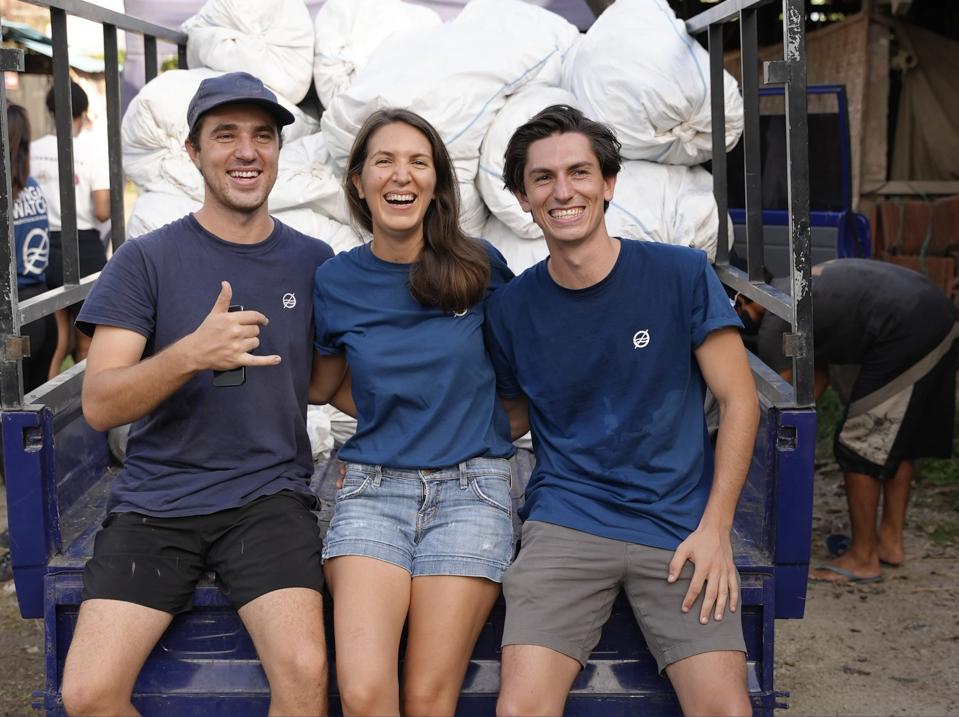What do you do when you’ve pulled over 7 million pounds of plastic out of rivers — and no one wants it?
That was the unexpected dilemma facing Sam Bencheghib and his siblings, co-founders of Sungai Watch, a nonprofit dedicated to cleaning Indonesia’s waterways (and 2024 Elevate Prize Winner). What began as a single trash barrier in a river near their parents’ home in Bali has since grown into a national movement, with over 300 rivers cleaned daily, a team of 165 full-time staff, and an ever-growing mountain of plastic waste in need of a second life.
It wasn’t the first time the Bencheghibs had taken action into their own hands. Growing up in Bali, they spent weekends organizing beach cleanups as teenagers — their first response to the plastic pollution washing ashore each rainy season. That early activism planted the seed for everything that followed: from building a media company to highlight environmental issues, to kayaking down the world’s most polluted river in boats made from plastic bottles to raise awareness.
But collecting trash is only half the battle. The next challenge? Figuring out what to do with it.
In 2024, the siblings launched Sungai Design — a for-profit social enterprise that transforms hard-to-recycle plastic into beautifully designed products. Their mission is simple but ambitious: reduce river pollution by building a circular system where trash is recovered, cleaned, reprocessed, and remade into something useful and desirable.
The company’s first product, the Ombak Chair, is made from 2,000 plastic bags — the most common type of waste Sungai Watch collects. “We had over 5 million pounds of trash sitting in our warehouses that nobody wanted to take,” Bencheghib explained. Sungai Design emerged as a direct response — and a creative one.
When the chair launched in March 2024, it sparked global interest. A video showing the transformation from river plastic to sculptural furniture went viral, amassing 198 million views and driving over 600,000 visits to their website in a matter of weeks. More than 10,000 people added the chair to their carts.
But there was a catch. At the time, they didn’t have an online payment system in place — nor the production capacity to meet demand. “We could only make four chairs a week,” said Bencheghib. “It took us over a year to fulfill the first wave of orders.”
Since then, they’ve scaled up. The Ombak Chair is now available as a flat-pack version, reducing shipping costs and expanding accessibility. The price has dropped by 30%, and customers now assemble the chair themselves — IKEA-style.
Sungai Design has also expanded its product line to include hospitality-grade items like tissue boxes, trays, and coasters — all made from plastic bags and other river waste. And they’re just getting started.
“We’re only tapping into one of the 30 materials we collect,” Bencheghib said. His team is now experimenting with recycling glass into ceramics, shredding fabric waste, and developing prototypes for phone cases — all made from river trash. They call it “modern day mining”: turning yesterday’s discarded packaging into tomorrow’s raw material.
What sets Sungai Design apart isn’t just its design sensibility — it’s the end-to-end control of its supply chain. The same organization that pulls plastic from the river also sorts, washes, recycles, designs, and manufactures the final product. That transparency gives every object a traceable origin and a powerful story.
It also fuels something bigger. By scanning and recording barcodes on every piece of waste collected, Sungai Watch has built a database of more than 2.5 million items — helping identify the most polluting brands and working with governments to push for policy change. Sungai Design doesn’t just recycle; it reinforces advocacy and systemic reform.
Now in its angel round, the company is raising $5 million to expand production, logistics, and team capacity. But Bencheghib is clear: this isn’t a Silicon Valley-style rocketship — it’s a long-term investment in infrastructure, innovation, and impact.
Sungai Design is proving that the future of environmental action won’t be won by cleanup alone — it will be built, piece by piece, by businesses that turn problems into products, and impact into infrastructure. What started as a river barrier in Bali is now a blueprint for global change — one chair, one story, one recycled plastic bag at a time.

